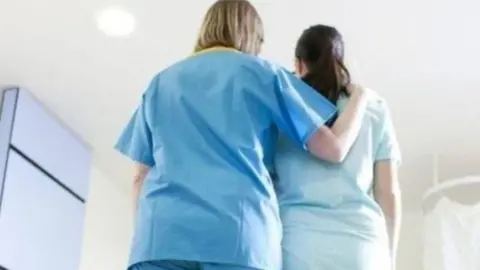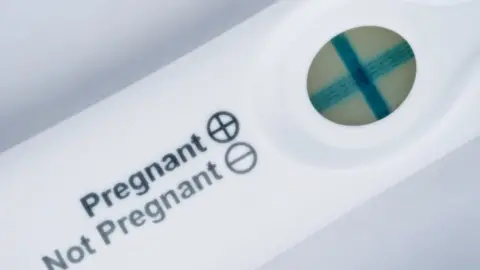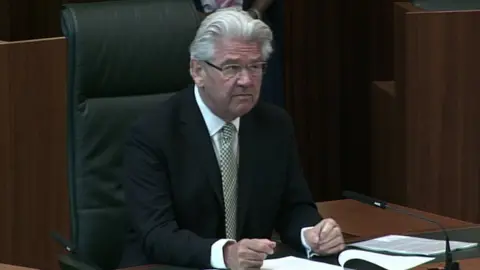Abortion: NI women not entitled to NHS terminations in England
 Photo Science Library
Photo Science LibraryThe UK's highest court has rejected an appeal by a mother and daughter in their legal battle for women from Northern Ireland to receive free abortions on the NHS in England.
The Supreme Court challenge centred on the case of a Northern Ireland woman who became pregnant when she was 15.
She went to England with her mother for an abortion in a private clinic in 2012, at a cost of about £900.
Northern Ireland's abortion law is much stricter than the rest of the UK.
Terminations are only permitted if a woman's life is at risk, or there is a permanent or serious risk to her mental or physical health.
Rape, incest and fatal foetal abnormalities are not circumstances in which abortions can be performed legally in Northern Ireland.
Judges 'sharply divided'
The mother and daughter took the case against UK Health Secretary Jeremy Hunt, who conceded that he had the power to make provisions for Northern Ireland residents to access free NHS abortions in England.
 highmagazin
highmagazinThey claimed that it was "unlawful" that he had not done so.
However, Supreme Court judges dismissed the mother and daughter's appeal by a narrow majority of three to two.
Delivering the ruling, Lord Wilson said it was not for the court to "address the ethical considerations which underlie the difference" in the law regarding abortion in Northern Ireland and England.
However, he said the five judges had been "sharply divided" on the case.
He expressed sympathy for women facing unwanted pregnancies in Northern Ireland and said the law put many of them in a "deeply unenviable position".
He said they faced "embarrassment, difficulty, and uncertainty" in their "urgent need to raise the necessary funds" to travel to Great Britain for private abortions.
 UK Supreme Court
UK Supreme CourtLord Wilson conceded that the financial burden had added to their "emotional strain".
But he did not rule in favour of the women's case, and dismissed their appeal, a decision with which his fellow judges Lord Reed and Lord Hughes agreed.
Their judgement acknowledged that under devolution, separate authorities in England, Scotland, Wales and Northern Ireland are responsible for providing free health services to those usually resident there.
'Democratic decision'
It stated that the health secretary was entitled to restrict access to NHS abortions "in line with this scheme for local decision-making".
The judgement added that Mr Hunt was "entitled to afford respect to the democratic decision of the people of Northern Ireland not to fund abortion services".
Lord Wilson added that Lady Hale and Lord Kerr gave dissenting judgments and would have allowed the appeal.
The mother and daughter, who cannot be named for legal reasons, said they will now take their case to the European Court of Human Rights.
In a joint statement, they said they were "really encouraged that two of the judges found in our favour" and that all of the judges had been "sympathetic" to their situation.
"We have come this far and fought hard because the issues are so important for women in Northern Ireland. For this reason, we will do all that we can to take the fight further.
"We have instructed our legal team to file an application with the European Court of Human Rights in Strasbourg, to protect the human rights of the many other women who make the lonely journey to England every week because they are denied access to basic healthcare services in their own country."
Devolutionary powers
Last year, more than 700 women from Northern Ireland travelled to England for an abortion last year, according to UK Department of Health figures.
The number was 100 fewer than the year before.
The mother and daughter initially took their case to the High Court in London in 2014, when the court heard they had struggled to part-raise the funds for a private abortion in England.
High Court judge, Mr Justice King, ruled at the time that the health secretary duty's to promote a comprehensive health service in England "is a duty in relation to the physical and mental health of the people of England".
He said that duty did not extend "to persons who are ordinarily resident in Northern Ireland".
His 2014 ruling also said that devolutionary powers had to be taken into consideration.
The following year, the women took their case to the Court of Appeal but again, they lost the argument.
'Significant strides'
The Supreme Court is the final court of appeal in the UK for civil cases.
However, the mother and daughter's lawyer, Angela Jackman, said on Wednesday her clients had made "significant strides" since the original High Court ruling.
She added that the split decision of the Supreme Court judges provided them with a "firm basis" for taking their case forward to the European Court of Human Rights.
The British Pregnancy Advisory Service (BPAS), which was among organisations that participated in the legal challenge, said it was disappointed with the overall verdict of the Supreme Court.
BPAS's chief executive Ann Furedi said: "NHS-funded abortion care may not have been declared a legal right for Northern Irish women today, but it is morally right to provide it."
She added: "They deserve the same care and compassion as all other UK citizens."
However, the Iona Institute, which is anti-abortion, said Northern Ireland "should be proud of its life-saving abortion law".
The Christian organisation added: "At a time when scientific advances have given us an amazing 'window' into babies in the womb we are right to continue to reject the permissive British abortion model."
